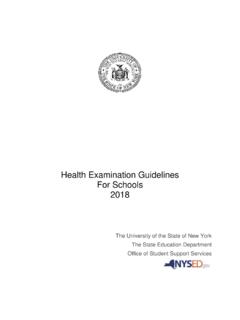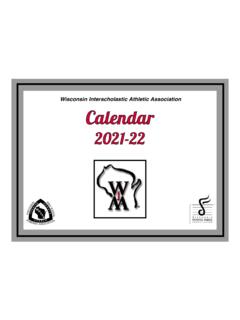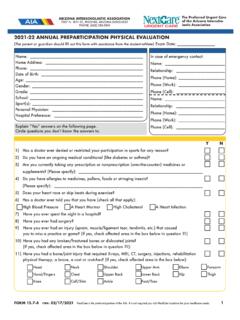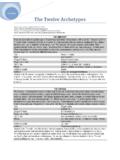Transcription of Extracurricular activities and their effect on the student ...
1 Vol. 10(20), pp. 2737-2744, 23 October, 2015 DOI: Article Number: 5BA96A655895 ISSN 1990-3839 Copyright 2015 Author(s) retain the copyright of this article Educational Research and Reviews Full Length Research Paper Extracurricular activities and their effect on the student s grade point average: Statistical study R. A. Bakoban and S. A. Aljarallah Department of Statistics, Faculty of Science, Faisaliah Campus, King Abdulaziz university , Jeddah, Saudi Arabia. Received 18 August, 2015; Accepted 14 October, 2015 Extracurricular activities (ECA) are part of students everyday life; they play important roles in student s lives.
2 Few studies have addressed the question of how student engagements to ECA affect student 's grade point average (GPA). This research was conducted to know whether the students grade point average in King Abdulaziz university , Faisaliah campus is affected by their participation in the ECA. This study also studied the students satisfaction on ECA. The study sample includes 239 students chosen via simple random sampling method. The study used inferential statistics to analyze this study design. To achieve the purpose of this study, a questionnaire (comprising 19 questions) was designed.
3 The results showed that participation in ECA affects the students GPA in a positive way. The study found that those who participated in ECA have higher GPA than those who did not; the study also found that the time spent participating in ECA did not affect the time students usually spend on studying (the result showed there wasn't any relationship between them). Furthermore, the study showed that students, based on faculty, are generally satisfied with the available Extracurricular activities in the campus.
4 Key words: Extracurricular activities , student 's GPA, ANOVA, MANOVA, non-parametric tests, Saudi Arabia. INTRODUCTION The primary goals of Extracurricular activities (ECA) were to focus on the individual ( student ) level, institutional level, and broader community level. The development of an individual is the principal goal of Extracurricular activities on faculties and in university campuses; the numerous experiences these activities afford positively impact the students' emotional, intellectual, social, and inter-personal development.
5 Through working with others, students can learn to negotiate, communicate, manage conflict and lead. Taking part in these out-of-the-classroom activities helps students to understand the importance of critical thinking skills, time management, and academic and intellectual competence. Involvement in activities helps students mature socially by providing a setting for student interaction, relationship formation and discussion. Working outside of the classroom with diverse groups of individuals allows students to gain more self-confidence, autonomy, and appreciation for others' differences and similarities.
6 Many authors have discussed ECA; Massoni (2011) describes the role of ECA and their possible positive effects on students of all kinds ranging from the above- *Corresponding : Authors agree that this article remain permanently open access under the terms of the Creative Commons Attribution License International License 2738 Educ. Res. Rev. average student to the student -on-the-brink of dropping out of school. "ECA are part of students everyday life; they play important roles in student s lives. ECA have positive effects on students life by improving behavior, school performance, school completion, individual aspects (prepare successful adults) and social aspects".
7 Clegg et al. (2009) research has directly addressed the question of what constitutes ECA; the extent to which students should engage in ECA; and how students experience and conceptualize the benefits from such engagements. This research sought to address these questions from a cultural capital approach. This research explores issues of inter-generational capital that might shape both the capacity to participate and how students understand the benefits. Richard and Aries (1999), conducted a study on the athlete student at division III school on academic performance, campus involvement and growth.
8 their sample study contains 219 senior students (a board spectrum of student -athletes). The result of their study revealed that athletic participation did not impede academic success, did not prevent involvement in most other ECA or with non-athletic. Also, athletes personal growth positively correlated with the time spent with teammates in games and practice. Another study conducted by Silliker and Quirk (1997) on the effect of Extracurricular activity participation (EAP) on the academic performance of male and female high school students.
9 This study examined whether EAP enhances the academic performance of high school students. The analysis carried out on the 123 students who played interscholastic soccer revealed that EAP does not affect, and may enhance academic performance (Male athletes showed in-season improvement in academic performance). Moreover, another research suggests that participation in Extracurricular activities may increase students' sense of engagement or attachment to their school, and thereby decrease the likelihood of school failure and drop out (Finn 1993; Lamborn et al.)
10 , 1992). If participation in Extracurricular activities can lead to success in school, then the availability of these activities to students of all backgrounds becomes an important equity issue. This study briefly examines the relationship between extra-curricular participation and student engagement in school. Kuh (1995), studied out-of-class experiences associated with student learning and personal development. This survey of 149 students explored learning from out-of-class college experiences such as leadership, peer interaction, faculty contact, work and travel.















